2024届高考英语语法:介词课件(共24张PPT)
文档属性
| 名称 | 2024届高考英语语法:介词课件(共24张PPT) |  | |
| 格式 | pptx | ||
| 文件大小 | 995.8KB | ||
| 资源类型 | 教案 | ||
| 版本资源 | 通用版 | ||
| 科目 | 英语 | ||
| 更新时间 | 2023-07-18 16:50:14 | ||
图片预览

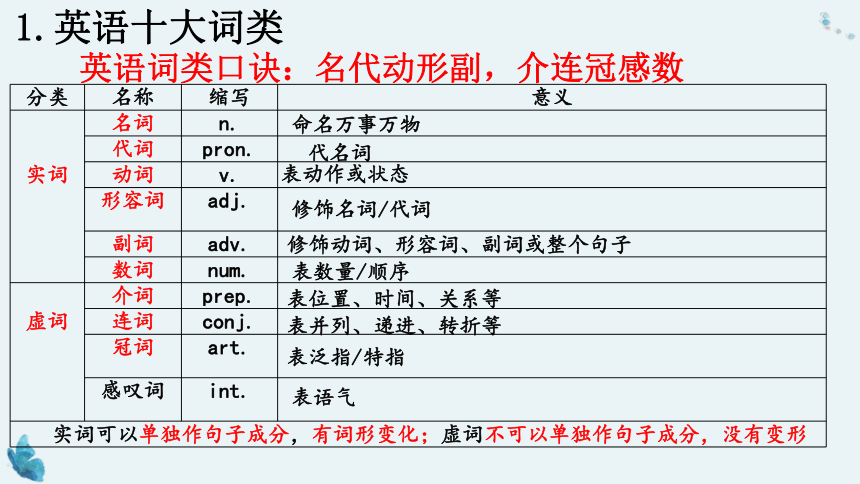
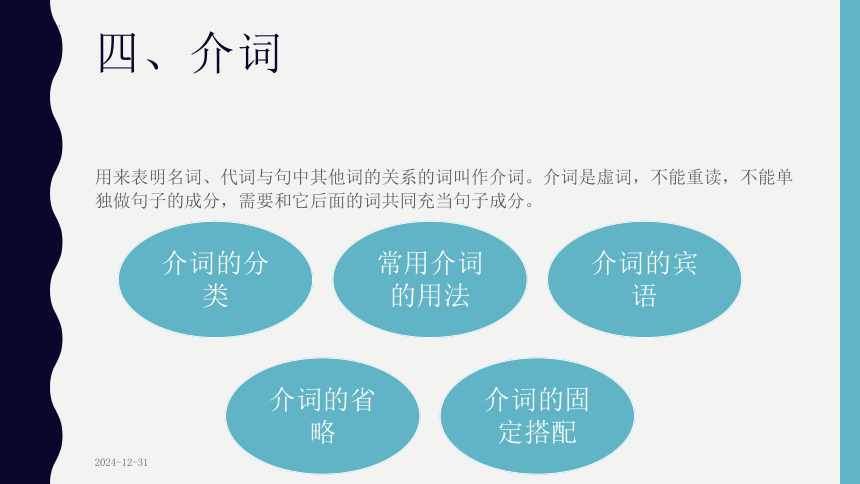
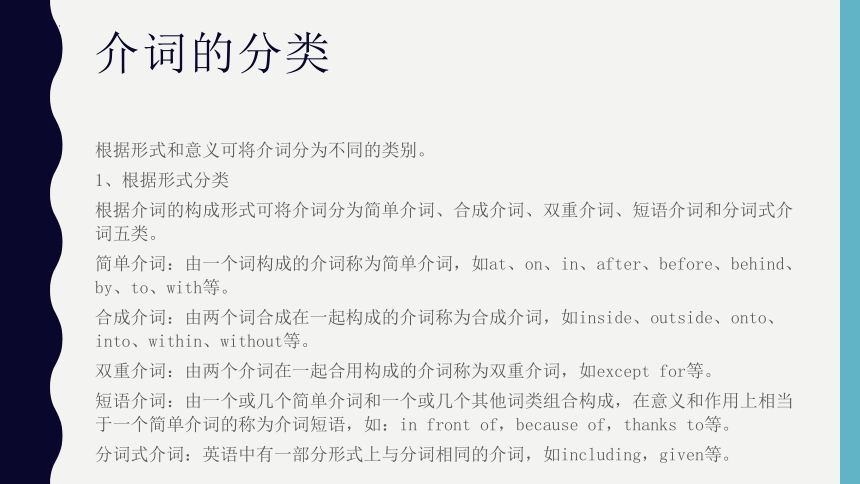
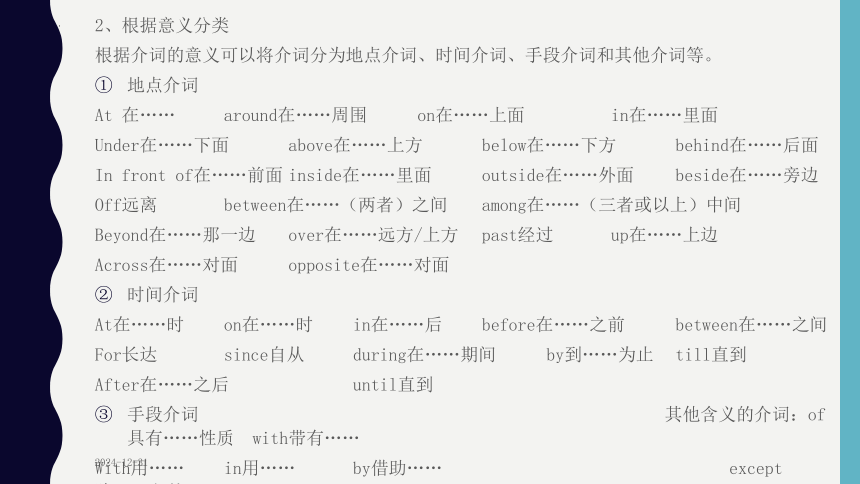
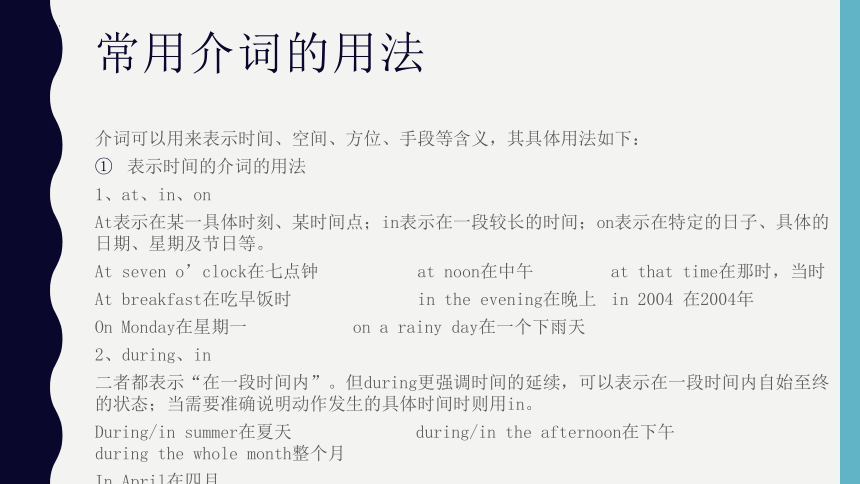
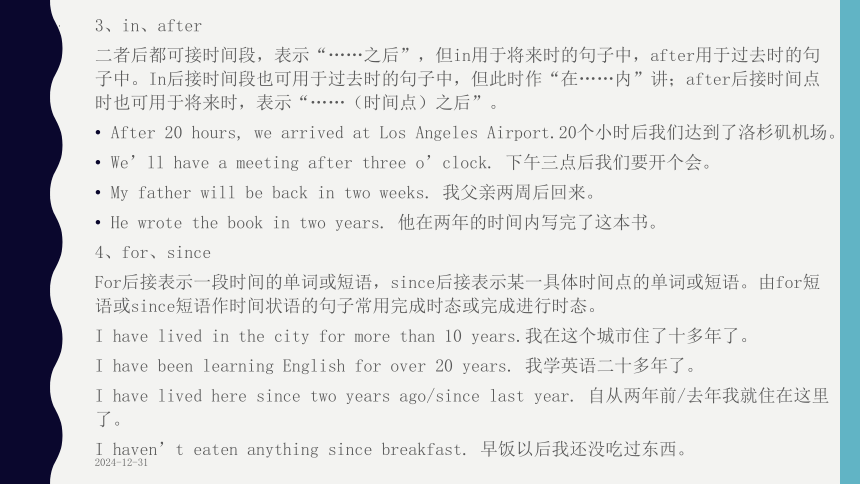

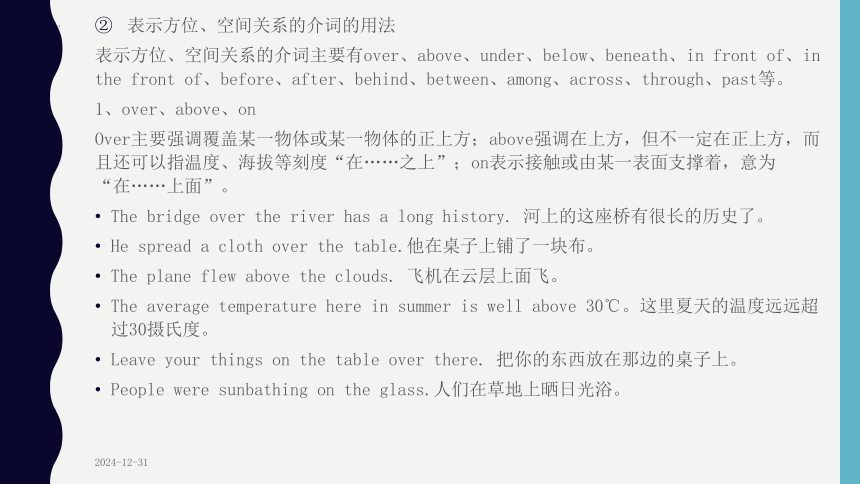
文档简介
(共24张PPT)
词法讲解
1.英语十大词类
分类 名称 缩写 意义
实词 名词 n.
代词 pron.
动词 v.
形容词 adj.
副词 adv.
数词 num.
虚词 介词 prep.
连词 conj.
冠词 art.
感叹词 int.
英语词类口诀:名代动形副,介连冠感数
命名万事万物
表动作或状态
修饰名词/代词
修饰动词、形容词、副词或整个句子
表数量/顺序
表位置、时间、关系等
表并列、递进、转折等
表泛指/特指
表语气
代名词
实词可以单独作句子成分,有词形变化;虚词不可以单独作句子成分,没有变形
四、介词用来表明名词、代词与句中其他词的关系的词叫作介词。介词是虚词,不能重读,不能单独做句子的成分,需要和它后面的词共同充当句子成分。介词的分类
根据形式和意义可将介词分为不同的类别。
1、根据形式分类
根据介词的构成形式可将介词分为简单介词、合成介词、双重介词、短语介词和分词式介词五类。
简单介词:由一个词构成的介词称为简单介词,如at、on、in、after、before、behind、by、to、with等。
合成介词:由两个词合成在一起构成的介词称为合成介词,如inside、outside、onto、into、within、without等。
双重介词:由两个介词在一起合用构成的介词称为双重介词,如except for等。
短语介词:由一个或几个简单介词和一个或几个其他词类组合构成,在意义和作用上相当于一个简单介词的称为介词短语,如:in front of,because of,thanks to等。
分词式介词:英语中有一部分形式上与分词相同的介词,如including,given等。
2、根据意义分类根据介词的意义可以将介词分为地点介词、时间介词、手段介词和其他介词等。地点介词At在…… around在……周围on在……上面in在……里面Under在……下面above在……上方below在……下方behind在……后面In front of在……前面inside在……里面outside在……外面beside在……旁边Off远离between在……(两者)之间among在……(三者或以上)中间Beyond在……那一边over在……远方/上方past经过up在……上边Across在……对面opposite在……对面时间介词At在……时on在……时in在……后before在……之前between在……之间For长达since自从during在……期间by到……为止till直到After在……之后until直到手段介词 其他含义的介词:of具有……性质with带有……With用…… in用…… by借助…… except除……之外常用介词的用法
介词可以用来表示时间、空间、方位、手段等含义,其具体用法如下:
表示时间的介词的用法
1、at、in、on
At表示在某一具体时刻、某时间点;in表示在一段较长的时间;on表示在特定的日子、具体的日期、星期及节日等。
At seven o’clock在七点钟 at noon在中午 at that time在那时,当时
At breakfast在吃早饭时 in the evening在晚上 in 2004 在2004年
On Monday在星期一 on a rainy day在一个下雨天
2、during、in
二者都表示“在一段时间内”。但during更强调时间的延续,可以表示在一段时间内自始至终的状态;当需要准确说明动作发生的具体时间时则用in。
During/in summer在夏天 during/in the afternoon在下午 during the whole month整个月
In April在四月
3、in、after二者后都可接时间段,表示“……之后”,但in用于将来时的句子中,after用于过去时的句子中。In后接时间段也可用于过去时的句子中,但此时作“在……内”讲;after后接时间点时也可用于将来时,表示“……(时间点)之后”。After 20 hours, we arrived at Los Angeles Airport.20个小时后我们达到了洛杉矶机场。We’ll have a meeting after three o’clock.下午三点后我们要开个会。My father will be back in two weeks.我父亲两周后回来。He wrote the book in two years.他在两年的时间内写完了这本书。4、for、sinceFor后接表示一段时间的单词或短语,since后接表示某一具体时间点的单词或短语。由for短语或since短语作时间状语的句子常用完成时态或完成进行时态。I have lived in the city for more than 10 years.我在这个城市住了十多年了。I have been learning English for over 20 years.我学英语二十多年了。I have lived here since two years ago/since last year.自从两年前/去年我就住在这里了。I haven’t eaten anything since breakfast.早饭以后我还没吃过东西。5、before、by二者都可表示“在……之前”,但by含有“最晚不迟于……,到……为止”的意思。如果by后是表示将来的时间,则与将来时或将来完成时连用,如果是表示过去的时间,则与过去完成时连用。I will be back before supper time.晚饭前我会赶回来。Supper will be ready by 6 p.m.晚饭将在6点之前准备好。(包括6点)This factory had produced more than one million cars by the end of last year.到去年年底,这家工厂已经生产了一百多万两小汽车。6、by、untilBy表示到什么时候为止动作已经完成,而until表示动作持续到什么时候.在终止性动词作谓语的否定句式中,二者通用。Can you repair my bike by Friday 星期五之前你能修好我的自行车吗?I’ll work here until six o’clock.我将一直在这里工作到六点。The work won’t be finished by/until tomorrow.这项工作明天才能完成。表示方位、空间关系的介词的用法表示方位、空间关系的介词主要有over、above、under、below、beneath、in frontof、in the front of、before、after、behind、between、among、across、through、past等。1、over、above、onOver主要强调覆盖某一物体或某一物体的正上方;above强调在上方,但不一定在正上方,而且还可以指温度、海拔等刻度“在……之上”;on表示接触或由某一表面支撑着,意为“在……上面”。The bridge over the river has a long history.河上的这座桥有很长的历史了。He spread a cloth over the table.他在桌子上铺了一块布。The plane flew above the clouds.飞机在云层上面飞。The average temperature here in summer is well above 30℃。这里夏天的温度远远超过30摄氏度。Leave your things on the table over there.把你的东西放在那边的桌子上。People were sunbathing on the glass.人们在草地上晒日光浴。2、under、below、beneathUnder强调在某一我提的正下方,是over的反义词;below指在下方,但不一定是正下方,是above的反义词;beneath表示“在……之下”,常与below互换,但below较常用,beneath多用于正式文体中。Shepleasedtheladderunderthewindow.她把梯子立在窗户下面。The boat lay under several feet of water.那条船沉在水下好几英尺处。Please do not write below this line.请不要在这条线下面写东西。The temperatures remained below freezing all day.气温一整天都在零度以下。Two girls are sitting beneath the tree.两个女孩坐在树下。Jo enjoyed feeling the warm sand beneath her feet.乔很喜欢脚下踩着温暖的沙子的感觉。3、before、afterBefore“在……前面”,指空间顺序时可与infront of通用;after“在……之后”,指空间顺序时与behind通用。He had performed before the Queen.他曾在女王面前献艺。Acouplewerejust sitting before/in front of me and making lots of noise during the whole film.在看电影的整个过程中,一对夫妇正好坐在我的面前,不断地制造噪音。Sheentered the hall after her mother.她跟在母亲后面进了大厅。It’s highly dangerous to ride a bike fast right after/behind a car.紧跟在汽车后面快速的骑自行车是很危险的。4、between、amongBetween一般用于两者之间,也可用于三者或三者以上,此时强调每两者之间的关系或某物体与一组特定的可分离的事物之间的关系;among常用于三者或三者以上,指数目不确定的事物之间。The house stands between two farms.这座房子位于两座农场之间。Switzerland lies between Franc, Germany, Austria , Italy.瑞士位于法国、德国、奥地利和意大利之间。The village lies among hills.这个村庄位于群山之间。Tom has always been popular among his classmates.汤姆在同学们中一直很受欢迎。5、in front of、in the front ofIn front of表示在某一空间外部的前面,in the front of表示在某一空间内部的前面。In front of my house runs a small river.我们家门前有一条小河。Don’t sit in front of the bus.不要坐在公共汽车的前面。6、around、round、aboutaround、round和about基本通用,指围绕某一位置或物体。We were sitting around/round/about the teacher ,playing games.我们围着老师坐着,做游戏。Don’t walk around/round/about the room.不要在房间里到处走动。7、across、through、past、overAcross强调穿过某一平面;through强调从某一空间内通过;past强调从某一事物的一旁经过;over强调从一边到另一边或越过某一高度。Be careful enough while walking across the street.过马路时务必小心。Walk through the gate and you’ll see the rest room.穿过大门你就会看到洗手间。We drove past the Great Hall of the People.我们开车经过人民大会堂。The dog jumped over the fence and ran away.狗跳过栅栏跑了。表示“用”工具、手段、材料的介词的用法表示“用”这一意义,指工具、手段、材料时常用介词with、by、in。with多指用工具、身体的某部位器官;by指使用方法、手段;in指使用某种语言或材料等。What can I cut the cake with 我可以用什么切蛋糕?You can see it with your own eyes.你可以亲自去看看。Why don’t we go there by car instead 我们为什么不坐汽车去那儿呢?He made the speech in English.他用英语做演讲。Don’t write it in pencil. Write it in ink, please.不要用铅笔写,请用钢笔写。表示“除……之外”的介词的用法英语中表示“除……之外”的介词有but、except、exceptfor、besides、apart from等。1、一般情况下,but和except通用,表示“除……之外”,其后的宾语是被排除在外的。Nobody but/except John knows the city well.只有约翰非常了解这座城市。I could come any day but/except Friday.除了星期五,我哪天都能来。Who except/but you should be to blame for the mistake 除了你还有谁应为这个错误负责呢?2、except for表示对整体说明作细节修正,即对主要部分的肯定和对局部的否定,一般不表示同类事物之间的关系。The street in the early morning is very quite except for a few cars.清晨的街道十分的安静,只是有几辆小汽车而已。The movie is good except for the ending.这部电影除了结尾部分其他都好。3、besides意为“除……之外还/也……”,其后的宾语是被包括在内的。Many students have been to the Great Wall besides me.除我之外,很多学生与也去过长城。Besides reading, I love listening to music.除了读书之外,我还喜欢听音乐。4、apart from意为“除……之外”,表示排除意义时相当于except,表示包括意义时相当于besides。The children hardly see anyone apart from their parents.除了他们的父母,孩子们很少见到其他人。Apart from being fun and good exercise, swimming is a very useful skill.除了有趣和是一项很好的运动之外,游泳还是一项很有用的技能。介词的宾语
介词和及物动词一样需要宾语,名词、动词-ing形式、代词、疑问词+不定式、个别副词、个别形容词、数词、从句等均可作介词的宾语。
1、名词、代词
We often play football in the afternoon.我们经常在下午踢球。
No one knows except you and me.除了你我之外,没人知道。
2、动名词
Thank you for helping me. 谢谢你帮了我。
3、疑问词+不定式
They failed to agree on where to spend their holidays.就去哪里度假一事他们没有达成统一意见。
4、个别副词
作介词宾语的副词主要表示时间或地点,如then、now、recently、here、there等。
Sonia should have been home by now. do you think she is OK
索尼娅应该已经到家了。你觉得她没事吧?
I looked everywhere except there. 除了那,我到处都看过了。
It’s too hot in here.这里面太热了。
5、个别形容词
一般来说,形容词不能作介词的宾语,但英语中有许多“介词+形容词”结构的习惯用语。常见的有far from perfect、in vain、for sure、for free等。
6、数词
There was only one piece of cake, but we can cut it into two.
只有一块蛋糕,但我们可以把它切成两半。
I get up at 6:00 every day.我每天6点起床。
7、从句
Tom was surprised at what she said.听到她说的话,汤姆很震惊。
Everything depends on whether you agree with us.一切都取决于你是否同意我们的观点。
单项填空
1.You can improve your English _____listening to English songs.
A.by B.with C.for D.in
2.—How does your father go to work
—He often goes to work on foot. But sometimes he goes to work ____ his bike.
A.on B.by C.with D.in
A
A
3.This story is _____ simple English. My little sister can read it.
A.for B.in C.with D.by
4.My right hand gets hurt. Can you help me cut up these vegetables ____ the knife
A.by B.for C.on D.with
5.—How do you usually go to school every day
—______ foot. It's not far from my home.
A.On B.In C.By D.With
B
D
A
单项填空
1.—It's said that the best way to relax is ____ exercise.
—I see.But you should keep away________ dangerous sports.
A.with; from B.for; off
C.through; from D.through; by
2.It's very important___ us to make a plan before a new term begins.
A.of B.with C.by D.for
D
C
3.I want to learn a second foreign language ____ English.
A.except B.beside
C.besides D.except for
4.Yesterday our headmaster made a speech _____ the environmental protection, and we learned something about recycling of waste.
A.about B.at C.to D.of
5.Humans can not make progress _____ dreams.
A.with B.without
C.through D.about
C
A
B
6.My sister dresses _____ a nurse.
A.as B.with C.of D.for
7.Our class are very sure to win the basketball game ____ Class Three.
A.of B.in C.against D.from
8.—Who is the boy _____ a blue T shirt
—He is my cousin.
A.on B.in C.of D.about
C
A
B
单项填空
1.Doing eye exercises is good ______our eyes.
A.at B.to C.for D.with
2.I won the first prize in the exam, so I was proud ___ myself.
A.in B.of C.at
3.—Could you help me cut ____the fruit I want to make fruit salad.
—Sure.
A. down B.off C.up D.out
C
B
C
4.He left school and began work _____ twelve.
A.at the age of B.at the beginning of
C.at the top of D.at the bottom of
5.It's bad manners to point _____ others with your chopsticks.
A.with B.on C.at D.about
6.Our team won the game.The coach was pleased _____ each member.
A.with B.to C.at D.in
A
C
A
7.— ______ my surprise, Li Ming was chosen into our school football team.
—Congratulations! I hope he'll be the best player in our team.
A.To B.With C.In D.For
8.He couldn't go through the door because there was a big box _____.
A.by the way B.in this way
C.in the way D.on the way
A
C
词法讲解
1.英语十大词类
分类 名称 缩写 意义
实词 名词 n.
代词 pron.
动词 v.
形容词 adj.
副词 adv.
数词 num.
虚词 介词 prep.
连词 conj.
冠词 art.
感叹词 int.
英语词类口诀:名代动形副,介连冠感数
命名万事万物
表动作或状态
修饰名词/代词
修饰动词、形容词、副词或整个句子
表数量/顺序
表位置、时间、关系等
表并列、递进、转折等
表泛指/特指
表语气
代名词
实词可以单独作句子成分,有词形变化;虚词不可以单独作句子成分,没有变形
四、介词用来表明名词、代词与句中其他词的关系的词叫作介词。介词是虚词,不能重读,不能单独做句子的成分,需要和它后面的词共同充当句子成分。介词的分类
根据形式和意义可将介词分为不同的类别。
1、根据形式分类
根据介词的构成形式可将介词分为简单介词、合成介词、双重介词、短语介词和分词式介词五类。
简单介词:由一个词构成的介词称为简单介词,如at、on、in、after、before、behind、by、to、with等。
合成介词:由两个词合成在一起构成的介词称为合成介词,如inside、outside、onto、into、within、without等。
双重介词:由两个介词在一起合用构成的介词称为双重介词,如except for等。
短语介词:由一个或几个简单介词和一个或几个其他词类组合构成,在意义和作用上相当于一个简单介词的称为介词短语,如:in front of,because of,thanks to等。
分词式介词:英语中有一部分形式上与分词相同的介词,如including,given等。
2、根据意义分类根据介词的意义可以将介词分为地点介词、时间介词、手段介词和其他介词等。地点介词At在…… around在……周围on在……上面in在……里面Under在……下面above在……上方below在……下方behind在……后面In front of在……前面inside在……里面outside在……外面beside在……旁边Off远离between在……(两者)之间among在……(三者或以上)中间Beyond在……那一边over在……远方/上方past经过up在……上边Across在……对面opposite在……对面时间介词At在……时on在……时in在……后before在……之前between在……之间For长达since自从during在……期间by到……为止till直到After在……之后until直到手段介词 其他含义的介词:of具有……性质with带有……With用…… in用…… by借助…… except除……之外常用介词的用法
介词可以用来表示时间、空间、方位、手段等含义,其具体用法如下:
表示时间的介词的用法
1、at、in、on
At表示在某一具体时刻、某时间点;in表示在一段较长的时间;on表示在特定的日子、具体的日期、星期及节日等。
At seven o’clock在七点钟 at noon在中午 at that time在那时,当时
At breakfast在吃早饭时 in the evening在晚上 in 2004 在2004年
On Monday在星期一 on a rainy day在一个下雨天
2、during、in
二者都表示“在一段时间内”。但during更强调时间的延续,可以表示在一段时间内自始至终的状态;当需要准确说明动作发生的具体时间时则用in。
During/in summer在夏天 during/in the afternoon在下午 during the whole month整个月
In April在四月
3、in、after二者后都可接时间段,表示“……之后”,但in用于将来时的句子中,after用于过去时的句子中。In后接时间段也可用于过去时的句子中,但此时作“在……内”讲;after后接时间点时也可用于将来时,表示“……(时间点)之后”。After 20 hours, we arrived at Los Angeles Airport.20个小时后我们达到了洛杉矶机场。We’ll have a meeting after three o’clock.下午三点后我们要开个会。My father will be back in two weeks.我父亲两周后回来。He wrote the book in two years.他在两年的时间内写完了这本书。4、for、sinceFor后接表示一段时间的单词或短语,since后接表示某一具体时间点的单词或短语。由for短语或since短语作时间状语的句子常用完成时态或完成进行时态。I have lived in the city for more than 10 years.我在这个城市住了十多年了。I have been learning English for over 20 years.我学英语二十多年了。I have lived here since two years ago/since last year.自从两年前/去年我就住在这里了。I haven’t eaten anything since breakfast.早饭以后我还没吃过东西。5、before、by二者都可表示“在……之前”,但by含有“最晚不迟于……,到……为止”的意思。如果by后是表示将来的时间,则与将来时或将来完成时连用,如果是表示过去的时间,则与过去完成时连用。I will be back before supper time.晚饭前我会赶回来。Supper will be ready by 6 p.m.晚饭将在6点之前准备好。(包括6点)This factory had produced more than one million cars by the end of last year.到去年年底,这家工厂已经生产了一百多万两小汽车。6、by、untilBy表示到什么时候为止动作已经完成,而until表示动作持续到什么时候.在终止性动词作谓语的否定句式中,二者通用。Can you repair my bike by Friday 星期五之前你能修好我的自行车吗?I’ll work here until six o’clock.我将一直在这里工作到六点。The work won’t be finished by/until tomorrow.这项工作明天才能完成。表示方位、空间关系的介词的用法表示方位、空间关系的介词主要有over、above、under、below、beneath、in frontof、in the front of、before、after、behind、between、among、across、through、past等。1、over、above、onOver主要强调覆盖某一物体或某一物体的正上方;above强调在上方,但不一定在正上方,而且还可以指温度、海拔等刻度“在……之上”;on表示接触或由某一表面支撑着,意为“在……上面”。The bridge over the river has a long history.河上的这座桥有很长的历史了。He spread a cloth over the table.他在桌子上铺了一块布。The plane flew above the clouds.飞机在云层上面飞。The average temperature here in summer is well above 30℃。这里夏天的温度远远超过30摄氏度。Leave your things on the table over there.把你的东西放在那边的桌子上。People were sunbathing on the glass.人们在草地上晒日光浴。2、under、below、beneathUnder强调在某一我提的正下方,是over的反义词;below指在下方,但不一定是正下方,是above的反义词;beneath表示“在……之下”,常与below互换,但below较常用,beneath多用于正式文体中。Shepleasedtheladderunderthewindow.她把梯子立在窗户下面。The boat lay under several feet of water.那条船沉在水下好几英尺处。Please do not write below this line.请不要在这条线下面写东西。The temperatures remained below freezing all day.气温一整天都在零度以下。Two girls are sitting beneath the tree.两个女孩坐在树下。Jo enjoyed feeling the warm sand beneath her feet.乔很喜欢脚下踩着温暖的沙子的感觉。3、before、afterBefore“在……前面”,指空间顺序时可与infront of通用;after“在……之后”,指空间顺序时与behind通用。He had performed before the Queen.他曾在女王面前献艺。Acouplewerejust sitting before/in front of me and making lots of noise during the whole film.在看电影的整个过程中,一对夫妇正好坐在我的面前,不断地制造噪音。Sheentered the hall after her mother.她跟在母亲后面进了大厅。It’s highly dangerous to ride a bike fast right after/behind a car.紧跟在汽车后面快速的骑自行车是很危险的。4、between、amongBetween一般用于两者之间,也可用于三者或三者以上,此时强调每两者之间的关系或某物体与一组特定的可分离的事物之间的关系;among常用于三者或三者以上,指数目不确定的事物之间。The house stands between two farms.这座房子位于两座农场之间。Switzerland lies between Franc, Germany, Austria , Italy.瑞士位于法国、德国、奥地利和意大利之间。The village lies among hills.这个村庄位于群山之间。Tom has always been popular among his classmates.汤姆在同学们中一直很受欢迎。5、in front of、in the front ofIn front of表示在某一空间外部的前面,in the front of表示在某一空间内部的前面。In front of my house runs a small river.我们家门前有一条小河。Don’t sit in front of the bus.不要坐在公共汽车的前面。6、around、round、aboutaround、round和about基本通用,指围绕某一位置或物体。We were sitting around/round/about the teacher ,playing games.我们围着老师坐着,做游戏。Don’t walk around/round/about the room.不要在房间里到处走动。7、across、through、past、overAcross强调穿过某一平面;through强调从某一空间内通过;past强调从某一事物的一旁经过;over强调从一边到另一边或越过某一高度。Be careful enough while walking across the street.过马路时务必小心。Walk through the gate and you’ll see the rest room.穿过大门你就会看到洗手间。We drove past the Great Hall of the People.我们开车经过人民大会堂。The dog jumped over the fence and ran away.狗跳过栅栏跑了。表示“用”工具、手段、材料的介词的用法表示“用”这一意义,指工具、手段、材料时常用介词with、by、in。with多指用工具、身体的某部位器官;by指使用方法、手段;in指使用某种语言或材料等。What can I cut the cake with 我可以用什么切蛋糕?You can see it with your own eyes.你可以亲自去看看。Why don’t we go there by car instead 我们为什么不坐汽车去那儿呢?He made the speech in English.他用英语做演讲。Don’t write it in pencil. Write it in ink, please.不要用铅笔写,请用钢笔写。表示“除……之外”的介词的用法英语中表示“除……之外”的介词有but、except、exceptfor、besides、apart from等。1、一般情况下,but和except通用,表示“除……之外”,其后的宾语是被排除在外的。Nobody but/except John knows the city well.只有约翰非常了解这座城市。I could come any day but/except Friday.除了星期五,我哪天都能来。Who except/but you should be to blame for the mistake 除了你还有谁应为这个错误负责呢?2、except for表示对整体说明作细节修正,即对主要部分的肯定和对局部的否定,一般不表示同类事物之间的关系。The street in the early morning is very quite except for a few cars.清晨的街道十分的安静,只是有几辆小汽车而已。The movie is good except for the ending.这部电影除了结尾部分其他都好。3、besides意为“除……之外还/也……”,其后的宾语是被包括在内的。Many students have been to the Great Wall besides me.除我之外,很多学生与也去过长城。Besides reading, I love listening to music.除了读书之外,我还喜欢听音乐。4、apart from意为“除……之外”,表示排除意义时相当于except,表示包括意义时相当于besides。The children hardly see anyone apart from their parents.除了他们的父母,孩子们很少见到其他人。Apart from being fun and good exercise, swimming is a very useful skill.除了有趣和是一项很好的运动之外,游泳还是一项很有用的技能。介词的宾语
介词和及物动词一样需要宾语,名词、动词-ing形式、代词、疑问词+不定式、个别副词、个别形容词、数词、从句等均可作介词的宾语。
1、名词、代词
We often play football in the afternoon.我们经常在下午踢球。
No one knows except you and me.除了你我之外,没人知道。
2、动名词
Thank you for helping me. 谢谢你帮了我。
3、疑问词+不定式
They failed to agree on where to spend their holidays.就去哪里度假一事他们没有达成统一意见。
4、个别副词
作介词宾语的副词主要表示时间或地点,如then、now、recently、here、there等。
Sonia should have been home by now. do you think she is OK
索尼娅应该已经到家了。你觉得她没事吧?
I looked everywhere except there. 除了那,我到处都看过了。
It’s too hot in here.这里面太热了。
5、个别形容词
一般来说,形容词不能作介词的宾语,但英语中有许多“介词+形容词”结构的习惯用语。常见的有far from perfect、in vain、for sure、for free等。
6、数词
There was only one piece of cake, but we can cut it into two.
只有一块蛋糕,但我们可以把它切成两半。
I get up at 6:00 every day.我每天6点起床。
7、从句
Tom was surprised at what she said.听到她说的话,汤姆很震惊。
Everything depends on whether you agree with us.一切都取决于你是否同意我们的观点。
单项填空
1.You can improve your English _____listening to English songs.
A.by B.with C.for D.in
2.—How does your father go to work
—He often goes to work on foot. But sometimes he goes to work ____ his bike.
A.on B.by C.with D.in
A
A
3.This story is _____ simple English. My little sister can read it.
A.for B.in C.with D.by
4.My right hand gets hurt. Can you help me cut up these vegetables ____ the knife
A.by B.for C.on D.with
5.—How do you usually go to school every day
—______ foot. It's not far from my home.
A.On B.In C.By D.With
B
D
A
单项填空
1.—It's said that the best way to relax is ____ exercise.
—I see.But you should keep away________ dangerous sports.
A.with; from B.for; off
C.through; from D.through; by
2.It's very important___ us to make a plan before a new term begins.
A.of B.with C.by D.for
D
C
3.I want to learn a second foreign language ____ English.
A.except B.beside
C.besides D.except for
4.Yesterday our headmaster made a speech _____ the environmental protection, and we learned something about recycling of waste.
A.about B.at C.to D.of
5.Humans can not make progress _____ dreams.
A.with B.without
C.through D.about
C
A
B
6.My sister dresses _____ a nurse.
A.as B.with C.of D.for
7.Our class are very sure to win the basketball game ____ Class Three.
A.of B.in C.against D.from
8.—Who is the boy _____ a blue T shirt
—He is my cousin.
A.on B.in C.of D.about
C
A
B
单项填空
1.Doing eye exercises is good ______our eyes.
A.at B.to C.for D.with
2.I won the first prize in the exam, so I was proud ___ myself.
A.in B.of C.at
3.—Could you help me cut ____the fruit I want to make fruit salad.
—Sure.
A. down B.off C.up D.out
C
B
C
4.He left school and began work _____ twelve.
A.at the age of B.at the beginning of
C.at the top of D.at the bottom of
5.It's bad manners to point _____ others with your chopsticks.
A.with B.on C.at D.about
6.Our team won the game.The coach was pleased _____ each member.
A.with B.to C.at D.in
A
C
A
7.— ______ my surprise, Li Ming was chosen into our school football team.
—Congratulations! I hope he'll be the best player in our team.
A.To B.With C.In D.For
8.He couldn't go through the door because there was a big box _____.
A.by the way B.in this way
C.in the way D.on the way
A
C
